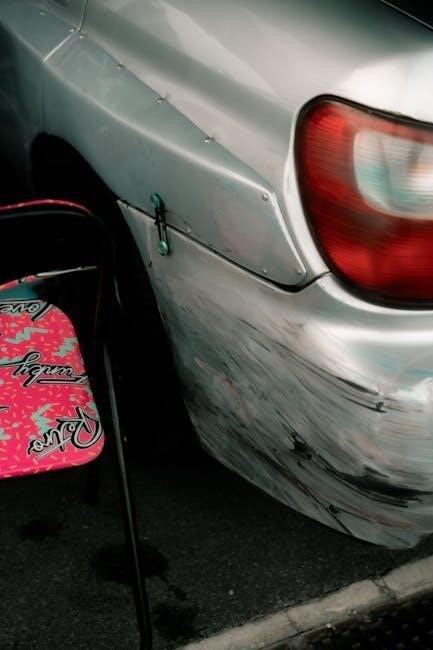A private settlement for a car accident is a legally binding agreement between parties to resolve disputes without court intervention‚ offering a quick and private resolution.
What is a Private Settlement for a Car Accident?
A private settlement for a car accident is a legally binding agreement between parties involved in a collision‚ allowing them to resolve disputes without court intervention. It is a mutual arrangement where both parties agree to settle claims amicably‚ avoiding litigation. This type of settlement typically involves one party agreeing to pay compensation for damages or injuries‚ while the other party waives their right to pursue further legal action. The agreement is finalized in writing‚ often using a template or form‚ and may require notarization depending on jurisdictional laws. Once signed‚ it becomes a formal contract‚ ensuring a swift and private resolution to the matter.
Why Use a Private Settlement?
A private settlement for a car accident offers a swift and cost-effective alternative to lengthy court proceedings. It allows both parties to avoid the financial burden and emotional stress associated with litigation. By settling privately‚ individuals can maintain privacy and control over the resolution process. This approach often leads to faster compensation for damages or injuries‚ providing immediate relief to victims. Additionally‚ it prevents the uncertainty of court outcomes‚ ensuring a mutually agreed-upon solution. Once signed‚ the agreement is legally binding‚ offering finality and closure. This method is particularly beneficial for minor accidents or cases where both parties are willing to resolve the matter amicably without involving legal representation.
Benefits of a Private Settlement
A private settlement for a car accident provides numerous advantages‚ including reduced legal costs‚ faster resolution‚ and the ability to maintain privacy throughout the process.
Advantages of Settling Privately
Settling a car accident privately offers several benefits‚ including avoiding lengthy court proceedings‚ maintaining confidentiality‚ and reducing legal fees. It also allows both parties to reach a mutually acceptable agreement without the stress of litigation. Additionally‚ private settlements often result in faster resolutions‚ enabling individuals to move forward without prolonged disputes. This approach is particularly beneficial for minor accidents where the damages are minimal and both parties are willing to compromise. By avoiding court‚ the process remains amicable‚ preserving relationships and focusing on finding a fair solution. Overall‚ private settlements provide a cost-effective and efficient way to resolve car accident disputes.
Avoiding Court Proceedings
One of the most significant advantages of a private settlement is the ability to avoid court proceedings entirely. Litigation can be time-consuming‚ costly‚ and emotionally draining‚ often taking months or even years to resolve. By opting for a private settlement‚ both parties can bypass the formal legal process‚ saving time and reducing stress. Additionally‚ avoiding court helps maintain privacy‚ as the details of the agreement remain confidential. This approach is particularly beneficial for minor accidents or disputes where the parties are willing to compromise and reach a fair resolution without involving legal representation. Avoiding court proceedings also eliminates the uncertainty of trial outcomes‚ ensuring a predictable and swift conclusion to the matter. This makes private settlements a practical and efficient option for resolving car accident disputes.
Cost-Effectiveness
Private settlements are often more cost-effective than pursuing legal action through the courts. Litigation involves numerous expenses‚ including attorney fees‚ court costs‚ and potential expert witness fees‚ which can accumulate quickly. In contrast‚ a private settlement allows both parties to avoid these high costs. By negotiating directly‚ either with or without legal representation‚ the financial burden is significantly reduced. Additionally‚ private settlements typically involve a one-time payment or agreed-upon compensation‚ eliminating the uncertainty of legal fees that can arise during prolonged court battles. This makes private settlements a financially attractive option for resolving car accident disputes efficiently and affordably. The cost savings can be substantial‚ benefiting both parties involved in the agreement.
Required Information for a Private Settlement
A private settlement requires detailed documentation‚ including accident details‚ vehicle information‚ injuries and damages‚ and the agreed-upon settlement amount to ensure clarity and validity.
Accident Details
Accident details are essential for a private settlement. They include the date‚ time‚ and location of the incident. A clear description of the collision‚ such as the vehicles involved and the circumstances surrounding the accident‚ must be provided. Additionally‚ any witness statements or police reports should be included to validate the claims. This information ensures both parties have a mutual understanding of the incident and forms the foundation for a fair and accurate settlement agreement. Including these specifics helps prevent disputes and ensures the settlement is comprehensive and legally binding.
Vehicle Information
Vehicle information is crucial for a private settlement. Both parties must provide details about the vehicles involved‚ including the make‚ model‚ year‚ and registration number. Additionally‚ the Vehicle Identification Number (VIN) should be included for accuracy. Information about the vehicle’s insurance and the driver’s license of the parties involved is also necessary. This data helps verify ownership and liability‚ ensuring the settlement is fair and legally binding. Including this information prevents disputes and ensures all parties have a clear understanding of the vehicles involved in the accident. Accurate vehicle details are essential for drafting a valid and enforceable private settlement agreement.
Injuries and Damages
Documenting injuries and damages is critical for a private settlement. Both parties must provide detailed accounts of any physical harm or property damage resulting from the accident. This includes medical reports‚ treatment plans‚ and expense records for injuries. For damages‚ include repair estimates‚ replacement costs‚ and any loss of use expenses‚ such as rental car fees. Photographic evidence of injuries and damages can also support claims. This documentation ensures a fair and accurate assessment of losses‚ helping to establish a reasonable settlement amount. By thoroughly detailing injuries and damages‚ both parties can reach a mutually agreeable resolution without court intervention.

Drafting the Settlement Agreement
Use a private settlement template to outline terms‚ ensuring a legally binding agreement that resolves the car accident dispute without court intervention.
Using Templates
Using a private settlement template simplifies the process of drafting an agreement. These templates typically include sections for accident details‚ vehicle information‚ injuries‚ damages‚ and settlement terms. They ensure all necessary information is included‚ making the agreement legally binding. Templates also outline the release of liability and payment terms clearly. By using a template‚ parties can avoid legal jargon and streamline the negotiation process. Many templates are available online‚ such as PDF forms‚ which can be customized to fit specific situations. This approach ensures the agreement is comprehensive‚ preventing future disputes. It also saves time and reduces the need for legal assistance‚ making private settlements more accessible and efficient for all parties involved.

Outlining Terms and Conditions
When outlining the terms and conditions of a private settlement‚ it is essential to ensure clarity and specificity. This includes detailing the settlement amount‚ payment timelines‚ and the release of liability. Both parties must agree on these terms to avoid future disputes. The agreement should clearly state that the settlement is final and prevents either party from pursuing further legal action. Including details about vehicle repairs‚ medical expenses‚ and any other damages is crucial. Terms should also specify how payments will be made and within what timeframe. A well-defined agreement ensures both parties understand their obligations‚ fostering a mutually acceptable resolution and preventing misunderstandings. This structured approach is vital for a legally binding and enforceable settlement.

Legal Considerations
Legal considerations in a private settlement for a car accident involve ensuring the agreement is legally binding and compliant with jurisdictional laws‚ including notarization requirements to validate the document.
Notarization Requirements
Notarization ensures the authenticity of signatures in a private car accident settlement. A notary public verifies the identities of all parties and witnesses their signatures. This step is crucial for the legal validity of the agreement‚ as it prevents disputes over the legitimacy of the signatories. Some jurisdictions mandate notarization for such agreements‚ while others may not‚ but it is highly recommended to ensure enforceability. Once notarized‚ the document becomes officially recognized‚ reducing the risk of legal challenges. It is important to check local laws to determine if notarization is required. Proper notarization involves the notary stamp and signature‚ confirming the voluntary and informed nature of the agreement. This process adds credibility and finality to the settlement.

Jurisdictional Laws
Jurisdictional laws play a critical role in private car accident settlements‚ as they dictate the legal framework governing the agreement. Each state or region has specific laws that must be adhered to‚ ensuring the settlement complies with local regulations. These laws may cover aspects such as the statute of limitations‚ required documentation‚ and notarization processes. It is essential to verify the jurisdictional requirements to prevent legal challenges or invalidation of the agreement. Failure to comply with local laws could result in the settlement being deemed unenforceable. Always consult with a legal professional to ensure the agreement aligns with the jurisdiction’s legal standards. Compliance with these laws is vital for a legally binding and enforceable private settlement. Proper jurisdictional adherence ensures the agreement is recognized and upheld if disputes arise.

Essential Clauses in the Agreement
Private car accident settlements must include specific clauses to ensure clarity and enforceability. These clauses cover liability release‚ payment terms‚ and dispute resolution‚ protecting both parties’ interests.
Release of Liability
A release of liability clause is a critical component of a private car accident settlement. It ensures that both parties agree to waive their right to pursue further legal action against each other. This clause provides a clear understanding that the settlement is final and binding‚ preventing any future claims arising from the accident. The release must be mutual‚ meaning both parties relinquish their rights to sue‚ ensuring a clean and permanent resolution. It is essential to draft this clause carefully‚ often with legal assistance‚ to avoid ambiguity. The release of liability must be explicitly stated in the agreement‚ outlining the scope of the waiver and ensuring compliance with jurisdictional laws. This clause protects both parties from potential future disputes;
Settlement Amount and Payment Terms


The settlement amount and payment terms are foundational elements of a private car accident agreement. The amount must cover all agreed-upon damages‚ including property damage‚ medical expenses‚ and lost wages. Payment terms should specify whether the settlement will be paid in a lump sum or installments. A clear timeline for payment must be outlined‚ ensuring both parties understand their obligations. The agreement should also detail the payment method‚ such as a check or bank transfer‚ and include any late payment penalties. It is crucial to ensure the terms are fair and legally binding‚ often requiring legal review to prevent disputes.

Finalizing the Agreement
Finalizing the agreement ensures both parties confirm the terms‚ complete the document‚ and execute signatures. Notarization may be required for legal validity‚ and a copy should be submitted to insurers.
Signatures and Witnesses
The final step in completing the private settlement agreement involves obtaining signatures from both parties and‚ if required‚ witnesses. Each party must sign and date the document to confirm their acceptance of the terms. Witnesses may be present to attest to the signing‚ adding credibility to the agreement. The signatures section should include full names‚ dates‚ and contact information for both parties. Some jurisdictions may require notarization to ensure the document’s authenticity. Once signed‚ the agreement becomes legally binding‚ and no further claims can be pursued. It is essential to ensure all parties understand the implications of their signatures before finalizing the document.
Submission to Insurers
After finalizing the private settlement agreement‚ it is crucial to submit a copy to the respective insurance companies. This step ensures that both parties’ insurance providers are informed about the resolution. The submission process typically involves sending a signed copy of the agreement along with a detailed report of the accident. This report should include the date‚ time‚ location‚ and a summary of the incident. Submitting the settlement to insurers prevents any future claims or disputes and ensures that both parties adhere to the terms agreed upon. Proper documentation and timely submission are vital to avoid any complications or misunderstandings with the insurance companies.
Avoiding Common Mistakes
A private settlement for a car accident must be a legally binding agreement‚ ensuring all details are accurately included to prevent future disputes or claims.
Ensuring Legal Binding
To ensure a private settlement for a car accident is legally binding‚ both parties must sign the agreement in the presence of a notary public. This step confirms the authenticity of the signatures and makes the document admissible in court if disputes arise. Additionally‚ the agreement must clearly outline the terms‚ including the settlement amount‚ payment terms‚ and release of liability. Legal counsel should review the document to ensure compliance with jurisdictional laws and prevent future claims. It is crucial to avoid vague language and ensure all details are explicitly stated. Without proper execution and clarity‚ the agreement may not hold up legally‚ leaving room for potential disputes or further legal action.
Completeness and Accuracy

Ensuring completeness and accuracy in a private car accident settlement is crucial to prevent future disputes; All details‚ including accident specifics‚ vehicle information‚ and injuries sustained‚ must be thoroughly documented. The settlement amount and payment terms should be clearly defined to avoid misunderstandings. Both parties must carefully review the agreement to confirm that all claims are addressed and no essential information is omitted. Incomplete or inaccurate documentation can lead to legal challenges or unresolved issues. It is essential to include witness statements‚ medical records‚ and repair estimates where applicable. By ensuring every aspect is covered‚ the agreement becomes a robust and final resolution‚ protecting both parties from potential legal complications. This attention to detail guarantees a fair and lasting settlement.
A private settlement for a car accident offers a efficient and cost-effective resolution‚ ensuring all parties reach a fair agreement without court involvement‚ with legal guidance recommended.
A private settlement for a car accident is a legally binding agreement resolving disputes without court involvement. It requires detailed documentation‚ including accident specifics‚ vehicle information‚ and injuries. Both parties must agree to the terms‚ ensuring fairness and clarity. Legal considerations‚ such as notarization and jurisdictional laws‚ are crucial for validity. Essential clauses include release of liability and payment terms. Drafting the agreement with templates and legal guidance is recommended to avoid mistakes. Finalizing involves signatures‚ witnesses‚ and submission to insurers. Completeness and accuracy are vital to prevent disputes. Understanding these key points ensures a smooth and legally sound private settlement process.
Final Thoughts
A private settlement for a car accident offers a efficient and confidential way to resolve disputes without legal battles. It ensures both parties reach a fair agreement‚ avoiding lengthy court proceedings and associated costs. Proper documentation‚ including accident details‚ vehicle information‚ and injury reports‚ is essential for a valid agreement. Legal considerations‚ such as notarization and jurisdictional laws‚ must be adhered to ensure the settlement’s enforceability. Using templates and legal guidance can help draft a clear and binding agreement. Finalizing with signatures and submitting to insurers ensures all parties are informed. By understanding these steps‚ individuals can navigate private settlements effectively‚ achieving a mutually beneficial resolution.
